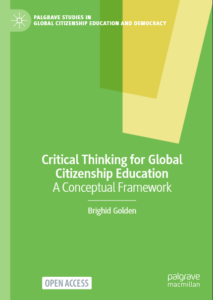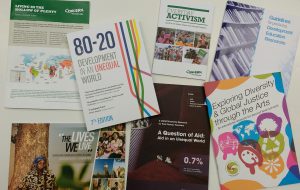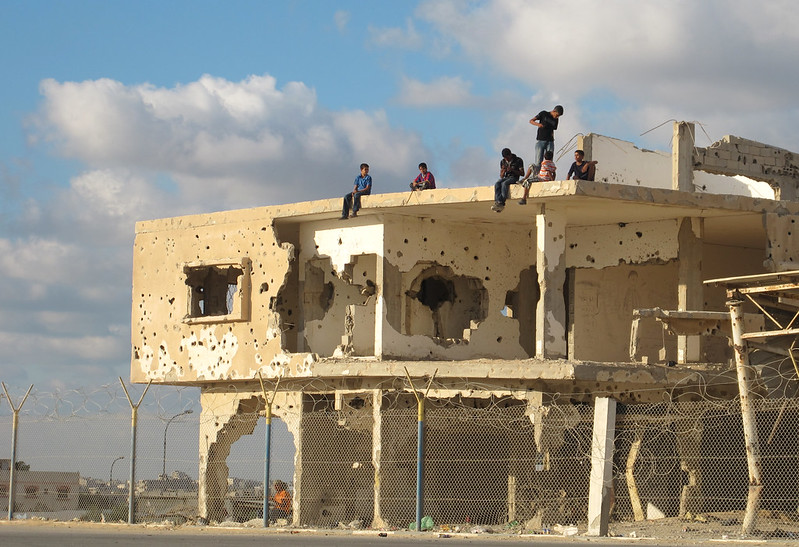- Children play atop a bullet-riddled building in Gaza. 05/10/2011. Photo by UN Photo/Shareef Sarhan via Flickr CC-BY-NC-ND
“I am constantly amazed by man’s inhumanity to man.”
– Primo Levi*, If This Is a Man / The Truce
The Holocaust was one of the negative icons of the 20th century. It provided one of the contexts for the rise of the human rights movement. The Preamble to the Universal Declaration of Human Rights refers specifically to ‘barbarous acts’; signifying the Holocaust and other crimes committed during World War Two. The Geneva Conventions of 1949, which set limits on the ways in which states may conduct themselves in armed conflict (irrespective of whether a state is waging a defensive or aggressive war), also came about as a result of the horrific crimes committed in the period 1939-1945. The Genocide Convention of 1948 which renders genocide a crime under international law and obliges states to punish the commission of genocidal acts is a direct consequence of the Holocaust. The concepts of war crimes and crimes against humanity came to be legally recognised in the Nuremberg Trials within the same context.
Apart from the developments described above there was another development which came about in the wake of the Holocaust: the birth of the state of Israel. That the Jewish people deserved protection and security as a greatly persecuted people (not just in the Holocaust) was evident. That the Jewish people should have their state built on land which was the home of Palestinians for hundreds of years was tragic.
The Palestinians were not the people who had persecuted the Jewish people through the centuries nor were they involved in any manner in the Holocaust. The European states who had tolerated (or in some cases encouraged) anti-Semitism over many centuries and Germany, who was responsible for the Holocaust, paid for their sins against the Jewish people with Palestinian land.
The UN’s partition plan of 1948 had, at least, the merit of allowing space for the Palestinian people to build a viable state. In the period from 1948 to this day the land available to the Palestinian people has steadily decreased to a point where it is now doubtful whether there can be a viable state for the Palestinian people. The continuing expansion of Israeli settlements on Palestinian land continues this process of diminution. The fact that Israel has occupied Palestinian territory way beyond its 1948 (and 1967) borders is a gross violation of international law and of the human rights of the Palestinian people. The current destruction being wrought on Gaza with its loss of life and loss of whatever infrastructure remained is evident to everyone.
Hamas may provide useful excuses to Israel for their military operations in Gaza. But under international humanitarian law (including the Geneva Conventions mentioned above) Israel must respect its basic principles: distinction, proportionality, precaution and necessity. It is up to everyone to judge for themselves whether Israel is complying with these principles. That Hamas is not respecting these principles is not a valid excuse since international humanitarian law is not based on reciprocity. Images of dead children on the beaches of Gaza are an un-appealable verdict on Israel and the international community who has allowed decades of suffering, killings and destruction to be meted out to the Palestinian people in general and to the people of Gaza in particular.
Israel prides itself as a democratic state which respects human rights and freedoms. The often heard statement is that it is the only democratic state in its region. Its actions as an occupying power, building settlements and destroying Gaza seem to show that democracy and human rights stop at its borders.
Anyone who visits a Holocaust Museum whether in Israel or elsewhere cannot help coming out feeling diminished as a human being (see, for example, the United States Holocaust Memorial Museum website and the Israeli Yad Vashem Holocaust Museum websites) . The ultimate message I take from the Holocaust is the infinite capacity for evil of humanity and of the moral imperative to act when evil is being done. Some Israeli leaders have sought to transform the message of the Holocaust into a special moral status for Israel where Israel can do no wrong and any criticism of Israel is anti-Semitic. This offends the universality of human suffering which the Holocaust is one testimony to.
Israel and the international human rights movement were born in the same era and within the same context. They were the products of immense human suffering and barbarous acts. The human rights movement is based on the concept of universality. We all have rights because we are all human beings. It is time for Israel to heed this concept; to acknowledge that it does not have a unique moral standing or a prerogative on suffering. We all suffer because we are all human: Jewish or Palestinian.
___________________________________________________________
*Primo Levi was an Italian Jewish chemist and writer and wrote about his experiences as a prisoner in the Auschwitz concentration camp in Nazi-occupied Poland during World War Two.
Explore more on developmenteducation.ie

From Nicaragua to Ireland: Fairtrade Coffee and Global Solidarity
Fátima Ismael of Soppexcca, Cathal Murphy from Bewley’s and Fairtrade practitioner Kieran Durnien discuss 20 years of Fairtrade coffee solidarity linking Nicaragua and Ireland.

Critical Thinking for Global Citizenship Education
Join Brighid Golden for the launch of her latest book, ‘Critical Thinking for Global Citizenship Education: A Conceptual Framework’

Your voice matters – 2026 user survey open
It’s January, its 2026, and we want to hear what you’d like us to feature or work on in 2026.

Calling Post Primary Teachers – Survey Participation Request
Your voice is vital in shaping the future of education for sustainable development in Ireland. Join a national survey for post primary teachers in October, led by DCU researcher Valerie Lewis

Webinar: Science for development on World Food Day
The webinar will feature YSTE projects, from Santa Sabina Dominican College (Dublin), Moate Community School (Westmeath) and CBS Thurles that focussed on nutrition and better food production, with Self Help Africa’s nutrition and gender specialist in Ethiopia, Sara Demissew.

Student & teacher webinar: Food, hunger and SDG 2
Join the World Food Day webinar for post primary school students and teachers which will explore SDG 2: Zero Hunger.

